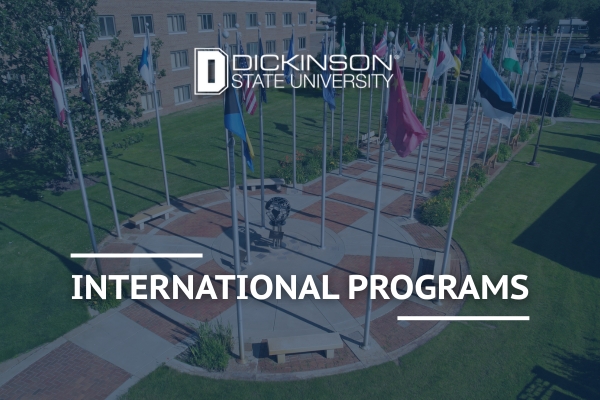Dickinson State University’s (DSU) International Programs office serves as a vital resource for both international and domestic students, playing a key role in fostering global engagement on campus. With three primary areas of focus—admissions and immigration services, student support, and intercultural opportunities—the office helps students navigate complex systems, adjust to life in a new country, and connect with peers from around the world.
A major responsibility of International Programs is guiding international students through the admissions and visa process, working closely with federal agencies such as U.S. Citizenship and Immigration Services, the Department of Homeland Security, and the Department of State. This process can be both intimidating and expensive for many students.
Once students arrive on campus, the office provides ongoing support to help them remain in compliance with visa regulations while also assisting with everyday needs—from academic concerns to opening a bank account or obtaining a driver’s license.
"The International Programs office exists to make sure students have the support they need to succeed both in and out of the classroom,” said Rus Kiser, Director of International Programs and Multicultural Affairs. “Whether it’s navigating immigration paperwork or helping someone feel at home, we’re here to ensure international students can thrive at DSU.”
International Programs also works to create cultural opportunities for all students through initiatives like the International Club and study abroad experiences. These efforts aim to broaden perspectives and provide exposure to diverse cultures. In 2024, for example, the office helped the DSU Agriculture Club organize a two-week educational trip to Japan.
Canada remains the top country of origin for international students at DSU, followed by Nigeria. Currently, students from 18 different countries are enrolled. The campus’s flag plaza reflects this diversity and is updated regularly.
Of the approximately 40 students studying on international visas, around eight to ten participate in athletics, including traditional and non-traditional sports such as rodeo and shooting sports.
Recruiting international students to rural North Dakota presents unique challenges. Many come from densely populated urban areas and must adjust to life in a small town and to a climate very different from their home countries. Other obstacles include language barriers, unfamiliar education systems, lack of public transportation, and financial strain. Currency fluctuations in recent years have made U.S. tuition even more costly for families abroad.
Despite the difficulties, many international students demonstrate remarkable resilience. Their presence on campus enriches the learning environment for all students.
“Getting involved on campus is one of the best things international students can do,” Kiser added. “Each new connection fosters understanding, combats stereotypes, and opens doors for both international and domestic students.”
International Programs continues to encourage all DSU students to engage with one another across cultural lines, building relationships that could have lasting academic, professional, and personal impact.
Click here for more information about DSU’s International Program.

